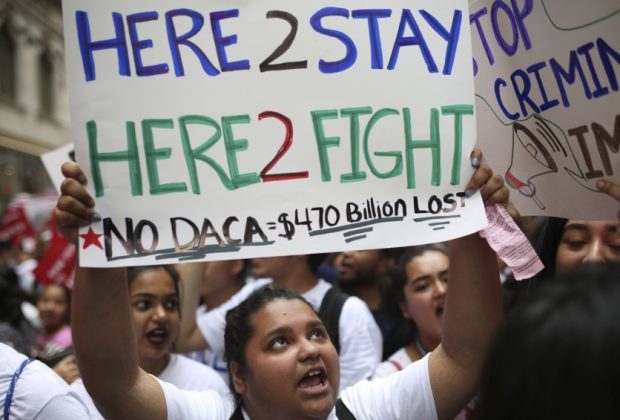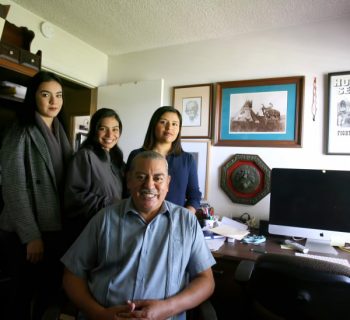AUGUST 25, 2017
As Hurricane Harvey lashed her small home in Houston with wind and rain, Carolina Ramirez hunkered down on Friday to face a threat she finds even more ominous: word that President Trump may be about to rescind the program that has allowed her to work and live there for the past five years without fear she’ll be deported.
Ms. Ramirez, 28, is one of the original beneficiaries of the Deferred Action for Childhood Arrivals program, or DACA. The program, whose fate is now up in the air, has allowed nearly 800,000 undocumented immigrants brought to the United States as children to work and study here for two-year renewable terms.
"It’s extremely frustrating that someone is trying to take away my livelihood after everything we’ve done," said Ms. Ramirez, who works on education issues as an organizer for United We Dream, a national organization that advocates on behalf of undocumented immigrants, known as Dreamers.
On Friday she monitored Twitter for hurricane updates and messaged fellow activists about protests planned over the next 10 days.
During his campaign, the president promised to rescind DACA as soon as he took office, but since then he has issued mixed messages to a group of young people he said at one point he’d treat with "great heart."
The Washington Post reported on Thursday that administration officials had met this week to discuss DACA and that a decision on its future may be imminent. (A spokeswoman for the Department of Homeland Security said Friday that DACA was still under review, and that no decision on its future has been made.)
"If Trump decides to end the successful DACA program, it would signal that he has decided to follow the advice of the more extremist voices in the White House and appeal to the white supremacists in his base rather than to courageously lead in this moment," Marielena Hincapié, executive director of the National Immigration Law Center, said in a statement on Thursday.
In June, 10 state attorneys general, led by Ken Paxton, of Texas, attempted to force the president’s hand on an issue he didn’t appear eager to tackle. They delivered an ultimatum to the U.S. attorney general, Jeff Sessions, demanding that he rescind the 2012 memorandum signed by President Obama that created DACA. They further demanded that he phase out the program by not renewing or issuing any new permits.
If he had not done so by September 5, they said, they would add a legal challenge to DACA to their pending lawsuit on a related program that would have protected undocumented parents of legal immigrants. That program, known as DAPA, was never formally enacted and has since been revoked.
Critics say DACA amounts to amnesty for people who came to the country illegally and question whether President Obama had the authority to enact it.
The Mexican American Legal Defense and Educational Fund (Maldef) responded to the threat of the attorneys general by saying that their "evident xenophobia is not remotely consistent with the trajectory of our nation’s history and future progress."
In an interview on Friday, Thomas A. Saenz, the fund’s president and general counsel, said that despite widespread reports that Mr. Trump was about to end DACA, he wasn’t convinced that a decision was imminent.
"It’s clear there’s a battle going on within the administration," Mr. Saenz said. "One side seems to be leaking stories to bolster its point of view."
The president, he said, "is not a person who likes ultimatums being placed on him, so I can see him ignoring the September 5 deadline. Why should he cave to the state of Texas?"
Costs and Benefits
In order to proceed with a legal challenge, Texas would have to show that it has standing to sue over DACA, Mr. Saenz added. To do that, it would have to prove that the costs of the five-year-old program outweighed the benefits — a tall order given the economic benefitsthat more than 100,000 unauthorized workers provide the state, according to the Center for American Progress, a liberal think tank.
Nationally, 685,000 workers would lose their jobs if DACA is ended, the center said, and the nation’s gross domestic product would take a $460-billion hit over the next decade.
"If the benefits outweigh the costs, there’s no standing, no injury," said Mr. Saenz.
Democratic state attorneys general have urged the administration to retain DACA. One hundred law professors signed a letter to President Trump this month saying there is "no question" DACA is legal.
Speculation that the president might soon end DACA has prompted defiant responses on Twitter.
For majority of Americans ending DACA on the heels of Charlottesville/ Arpaio will cement forever that Trump is a racist President. Forever. https://t.co/3cEmYDZOCs
— Jesse Lee (@JesseCharlesLee) August 25, 2017
Dreamers vow to "fight like hell" to defend #DACA amid rumors Trump will end program #DefendDACAhttps://t.co/vA1MexkpUS
— Nat'l Imm Law Center (@NILC_org) August 25, 2017
Groups and individuals who favor tougher immigration enforcement are also keeping up the pressure.
.@POTUS is returning to Phoenix, where he promised to “immediately terminate” DACA. Seven months into his presidency, it remains. #EndDACA
— FAIR (@FAIRImmigration) August 22, 2017
The Justice Department has declined to say whether it will defend the program if a lawsuit is filed. That led one former top government lawyer to conclude that DACA’s days are numbered.
"It doesn’t make sense to keep the program in place and invite a lawsuit challenging it if the Justice Department is not committed to defending it," said Paul Virtue, former general counsel and chief legal officer of the U.S. Immigration and Naturalization Service from 1983 to 1999.
Because DACA was created by executive order instead of through legislation, it can be unwritten by President Trump as easily as it was created by President Obama, Mr. Virtue said.
"I believe President Obama did have the authority to create the DACA program, because I see it as simply a prioritization of limited resources for removal of individuals from the U.S.," said Mr. Virtue, who is now a lawyer focusing on global immigration issues. He said most people would agree that the focus should be on deporting criminals, not law-abiding young people who were brought here illegally as children.
Mr. Sessions may not like DACA, but if the program is challenged, the Justice Department would have to defend it, said Mr. Saenz. It would be joined, though, by Maldef and other groups that intervene on the program’s behalf.
The uncertainty over DACA’s fate is putting renewed pressure on Congress to act.
Two pending bills would provide various levels of protection to young undocumented immigrants if the DACA program is ended. Although the bills have bipartisan support, they are likely to encounter fierce opposition from those who see any such protections as unwarranted amnesty.
A recent report suggested that top White House officials might be encouraging Mr. Trump to retain DACA and use it as a bargaining chip to secure funding for a border wall. Top Democrats have rejected that idea, as have advocates for Dreamers.
‘White-Supremacist Agenda’
Meanwhile, the fight is personal for immigrants like Ms. Ramirez, who was brought to the United States at age 4 from Piedras Negras, a small city near the Texas border. She grew up in Port Arthur, Tex., and didn’t receive DACA protection until two years after she graduated from Lamar University, in 2010.
By that point, she’d spent years volunteering with groups that were fighting for the Dream Act, legislation that would have given her a path to citizenship but failed repeatedly to get congressional approval. She said she was tired of seeing DACA used as a political football.
"We need to escalate our efforts now to fight what is clearly part of a white-supremacist agenda," she said.
Ms. Ramirez remembers vividly how she learned that the Dream Act had been defeated, yet again, in 2010. She was walking across the stage at her college graduation and looked down at her phone for a text message from fellow organizers. The unwelcome news flashed across her screen.
She said she fell into a depression and took a job cleaning a bowling alley to help support her family. Unable to get a driver’s license, she drove to work without one, in constant fear of being pulled over.
In 2012, when President Obama signed DACA, she was among the first recipients. She taught high-school Spanish in Orange, Tex., before moving to Houston to work with United We Dream. On Friday, after stocking up on bottled water and canned goods, she said she saw an eerie parallel between the approaching hurricane and the looming deadline on DACA. "I feel like I’ve been preparing for moments like these for years," she said with a laugh, "always organizing, hunkering down, and relying on my community to make it through the rough times."
Katherine Mangan writes about community colleges, completion efforts, and job training, as well as other topics in daily news. Follow her on Twitter @KatherineMangan, or email her at katherine.mangan@chronicle.com.
Source:







